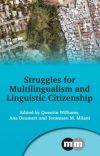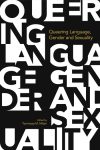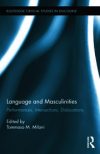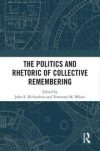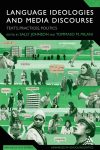Tommaso M. Milani

Education
Professional Bio
Tommaso M. Milani is an interdisciplinary scholar who works at the intersections of Applied Linguistics, Jewish Studies, African Studies and Women’s, Gender and Sexuality Studies. Before joining The Pennsylvania State University, he held positions at the University of the Witwatersrand, Johannesburg, South Africa and the University of Gothenburg, Sweden. His research aims to understand how power (in)balances are reproduced and contested through meaning-making resources (language, visuality, the body etc.). While identifying strongly with the intellectual tradition of critical discourse analysis, he is not committed to a single theoretical paradigm. In his analyses of language and power he has drawn upon different theoretical frameworks, which include but are not limited to, language ideology, intersectionality, queer theory, southern/decolonial perspectives and theories of affect. Over the last ten years, his main research focus has been on the spatial semiotics of gender and sexuality (see the special issue of Language in Society edited with Kira Hall and Erez Levon on Navigating normativity: Gender and sexuality in text and talk; and the book Queering Language, Gender and Sexuality). While still interested in language and space, he has recently shifted his attention to discursive constructions of time. Together with John E. Richardson (University of the Sunshine Coast), he is currently working on a project about collective remembering, focusing in particular on the commemoration of the victims of the Shoah in Italy and Sweden. He also collaborates with the Swedish Yiddishist Sarah Schulman (Dos Nisele Förlag, Stockholm) on a project about Yiddish in Sweden. Since 2020 he has been editing the journal Language in Society (together with Susan Ehrlich, York University).
Publications
Select Articles and Book Chapters
Milani, T. M., & Richardson, J. E. (2022). Discourses of collective remembering: contestation, politics, affect. Critical Discourse Studies, 20(5), 459–476.
Milani, T. M., & Richardson J. E. (2022). Responsibility for justice in action: commemoration, affect and politics at Il Memoriale della Shoah in Milan. Critical Discourse Studies, 20(5), 561–580.
Milani, T. M., & Rodrigo, B. (2022). Queer(ing) methodologies. In U. Fick (Ed.), The Sage Handbook of Qualitative Research Design, Vol. 1. (pp. 194-209). Thousand Oaks: Sage.
Milani, T. M., Bauer, S., Carlson, M., Spehar, A., & von Brömssen, K. (2021). Citizenship as status, habitus and acts: Language requirements and civic orientation in Sweden. Citizenship Studies, 25(6): 756–772.
Milani, T. M., & Richardson, J. E. (2021) Introduction: Discourse and affect. Social Semiotics, 31(5): 671–676.
Milani, T. M. (2020). No-go zones in Sweden, The infectious communicability of evil. Language, Culture and Society, 2(1): 7–37.
Milani, T. M. (2019) Queer performativity. In K. Hall & R. Barrett (Eds.), The Oxford Handbook of Language and Sexuality. Oxford: Oxford University Press.
Milani, T. M. & Lazar, M. (2017). Seeing from the South: Discourse, gender and sexuality from southern perspectives. Journal of Sociolinguistics, 21(3), 307–319.
Milani, T. M., & Levon, E. (2017). Queering multilingualism and politics: Regimes of mobility, citizenship and (in)visibility. In R. Wodak & B. Forchtner (Eds), The Routledge Handbook of Language and Politics (pp. 528-540). London: Routledge.
Milani, T. M. (2016). Language and sexuality. In O. Garcia, M. Spotti & N. Flores (Eds.), The Oxford Handbook of Language and Society (pp. 403-422). Oxford: Oxford University Press.
